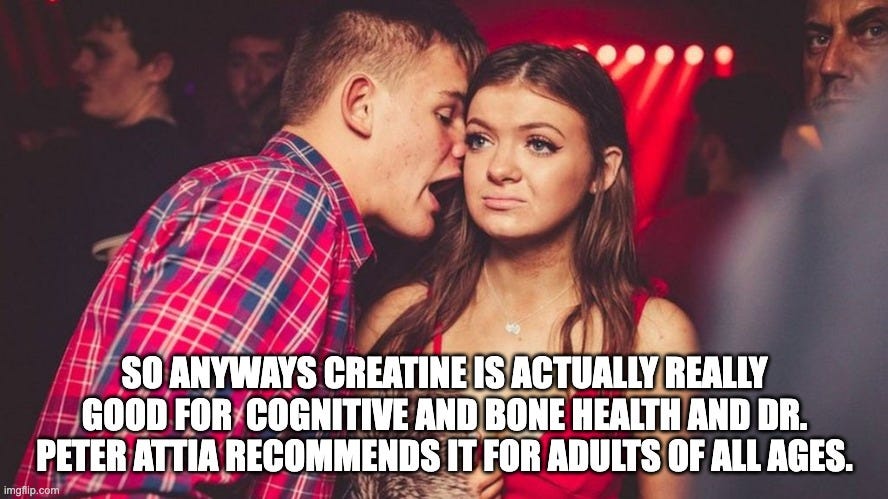The emotional effects of being healthy
The pros and cons of being a Very Healthy Person
The last two issues focused on how to figure out if you’re healthy, and the major nutrition, exercise, and behavioral changes one needs to do to get into A+ health. This issue is about answering, “so what?” What happens when you check all those boxes, physically and emotionally?
I spent 2023 following all the health advice I put forward in those issues. I worked out 5x a week. Ate my weight in protein and fiber. Cut down on alcohol to less than 7 drinks a week. Slept like a champion. What changes did that create? I’m going to layout the 3 buckets of stuff I noticed:
the positive effects
the changes I expected to get, but didn’t
the negative effects
The positive effects
Being a health nut had two direct effects:
Looking good naked
Feeling physically capable and not straining my back like a feeble wimp if I picked something up off the ground
I highly value both. These two alone are worth the price of admission for me. I feel like both are pretty self-explanatory, so I’ll move on here…
The changes I expected to get, but didn’t
A lot of Very Healthy People on the Internet will talk about how much more energy they have after taking their health seriously, and how it improves their mood. I didn’t feel either effect. I was a decently happy and energetic guy before, and I’m a decently happy and energetic guy now. Waking up still sucks. I still need two coffees to feel “on it” in the morning. I still have a lull in energy in the afternoon.
I feel like the mood and energy changes are more pronounced for folks whose health, for lack of a better term, was poor before deciding to take health seriously.
The negative effects
To be blunt, I became insufferable. At least by my standards. My original intention of getting healthy was to feel reasonably capable into my 80s. Somewhere along the way I started buying toe spacers (to make my toes straighter) and amassed a collection of powder supplements that would rival Scarface’s inventory in volume. Half the conversations I had with my girlfriend involved me giving her unsolicited health advice, resulting in her repeatedly wishing she could throw me in a locker for being so annoying and lame. Health had become a game of optimizing my life around protocols that improved biomarkers I could barely describe. I lost the plot.

In my experience, health influencers and Very Healthy People have either personally experienced an adverse health event or witnessed a loved one go through it - I certainly was spurred by one of these events myself. These events create fears and insecurities which can be incredible fuel for achieving incredible things. But they don’t always serve the person either.
For example, my drive to be healthy led to be buying a lot of shit - a lot of protocols, powders, and tests that I didn’t need. And a part of me knew it was a waste of time and money. And another part of me thought just maybe it would make a big difference. Because someone on the Internet said it did. And also buying health stuff is fun. I may not always know why I’m doing it, but it feels like I’m upgrading something.
To be clear, the first two newsletters about getting into A+ health and the tests to figure out if you’re healthy have the b.s. culled. That’s advice I still plan on following for the rest of my life.
But physical health is not the main game I want to play - men’s work is. I found myself moving my own goal posts so I could continue playing the Health Stuff Industry’s game instead of mine. They’re better at marketing than men’s work is, and they got my attention as a result.
What game am I playing?
This issue isn’t specific to physical health. Take any aspect of personal development - emotional intelligence included - and most folks get lost in the sauce at some point in their journey. There’s a whole Instagram account, Healing from Healing, devoted to poking fun at people getting obsessed with themselves in their emotional healing journey. Like this meme describing a dude looking for enlightenment:

Or take this recent article about what it’s like to be in a polycule: “Some people like to run marathons. We like to do polyamory, complex relationship stuff. Sarah’s favorite activity for the two of us to do is couples therapy,” Nick says, smiling. “Navigating the relationship dynamics is kind of generally a fun thing for us. It’s like for relationship nerds.”
Clearly polyamory, aka relationship therapy on steroids, is the game they like to play. But most people trying to open up a relationship are not trying to prioritize that game in their life. They fall into it, and then realize they’re spending way too much asking how their lover’s lover’s lover is doing, and they want out.
In men’s work, there’s a common archetype called “The King.” I describe it more detail here, but the Cliff Notes version is that it’s the voice in every man that asks the question “what game am I playing?” It’s the decider. The voice or part that takes a step back and asks “is this for me?”
For big changes in our life, we need to change the game we want to prioritize. For about the first 6 months, I’m glad I became a health nut. It’s easy to lose the plot in personal development though. There are entire industries devoted to encouraging going deeper or higher in the name of mental or physical health. I just try to ask myself “whose game am I playing?” sooner rather than later. And if it is later, having a partner threaten to shove me in a locker is a solid failsafe.


